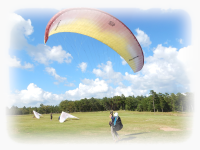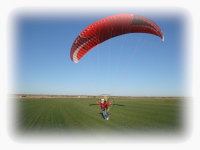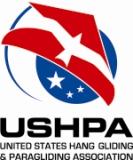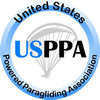Paramotor Warning and Caution
Always remember that an ultralight's power plant can quit working at ANY time.
NEVER FLY OVER TERRAIN WHERE YOU CANNOT MAKE A SAFE LANDING. Always fly within gliding distance of a safe landing area. Do you have to cross areas on which you cannot land? Climb higher or go around. It's that simple. NEVER fly in strong winds (15 mph or more).
WARNING
The ultralight, engine and/or components do not comply with Federal safety regulations for standard aircraft and have not received any safety or durability testing. An ultralight is for use in circumstances in which a power plant failure will not compromise safety. Before using an ultralight, engine and/or components, read all instructions thoroughly.
DANGER
The ultralight's power plant is subject to sudden stoppage. Power plant stoppage can result in forced (emergency) landings. Such landings can lead to serious bodily injury or death if they are not done is a safe area. Never fly any ultralight equipped with any engine and/or components at locations, airspeeds, altitudes, or other circumstances from which a successful no-power landing cannot be made. Never depend on a power plant to keep you in the air.
A POWER PLANT FAILURE IS NO EXCUSE FOR AN ACCIDENT.
If you ever fly into situations where a power plant failure would be hazardous, you are at risk. If you ever find yourself trusting the safety of a power plant, you are at risk. You have the ability to eliminate that risk.
Users of ultralights assume all risk of use and acknowledge by their use that the power plant is subject to sudden stoppage where they will be forced to land.
CAUTION
Any sport involving heights, moving parts or flammable fuel may cause injury or death A TOTAL AND COMPLETE PREFLIGHT check before each and every use is of utmost importance. LOOSE CLOTHING AND HAIR can be easily sucked into not only the propeller but into the cooling fan intake.
BE SAFE!
- Avoid terrain that will prevent a safe emergency landing.
- Maintain sufficient altitude to permit a safe landing in the event of engine failure.
- Exercise extreme caution when around a power plant.
- Keep children, pets and others away.
- Treat propeller and belts like invisible knives when in rotation. In addition, a prop strike may throw broken pieces hundreds of feet.
- Keep hands, flammables, etc. away from hot components of the power plant, especially the exhaust. The power plant can cause burns and fire.
- Be sure the craft is secure and under control before starting and throttling up.
- Tremendous thrust and torque may be produced. Be sure the carburetor is set to idle, and will return to idle after applying throttle before starting the motor. A motor with the throttle stuck in full power is EXTREMELY dangerous.
- Make sure the kill switch is functional.
PREFLIGHT
Each and every component must be checked before each and every use. Inspection of power plant is the responsibility of the user.
- Check for obstruction of vent, air filter and fuel filter.
- Inspect throttle linkage and ignition wiring.
- Check for leaks, improper condition, and looseness of parts such as lines, hoses and clamps.
- Check for cracks in the carburetor adapter or primer bulb.
- Check for cracks and improper attachment of exhaust.
- Check for cracks, looseness of mount, and looseness of engine to mount.
- Check for condition and possible deterioration of flexible vibration dampeners (motor mounts).
- Check for visual evidence of excessive oil or fuel leaks and sources of such leaks.
- Check for fuel contamination. Check that fuel shutoff is in "open" or "on" position.
This information is by no means a complete list of things that may need to be checked or could go wrong. Scenarios involving human quality control, unfamiliar applications and uses, and consumer assembly error are too numerous to mention here. Use proper discretion when using and DO NOT use without receiving proper training.
Extreme caution should be exercised when assembling or using an ultralight, power plant and/or components, along with patience and knowledge of proper use and care.
![]()




